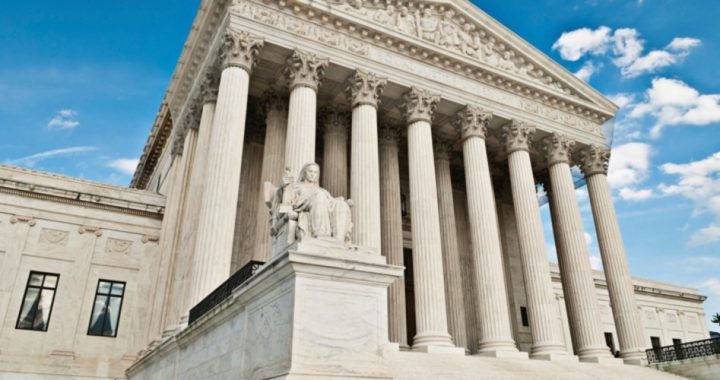
The Supreme Court may weigh in on President Trump’s executive order temporarily suspending travel to the United States from six nations known for fostering Islamic terrorism. On Thursday, the Trump administration filed emergency applications asking the court to block two lower court rulings against the “travel ban” executive order.
Almost as soon as President Trump issued the order to suspend the highly controversial — and equally dangerous — refugee program, the backlash began. One motion after another was filed to block his order and for more than four months, the case has bounced from federal court to federal court. On May 25, the Fourth Circuit Court of Appeals in Richmond, Virginia, upheld a ruling from a lower court in Maryland blocking the executive order from taking effect.
The Ninth Circuit Court of Appeals had already ruled against the executive order in a separate motion in February.
President Trump revised his original executive order — from late January — by issuing a new order on March 6. That order temporarily suspended travel into the United States from six nations known as hotbeds of Islamic terrorism: Iran, Libya, Somalia, Sudan, Syria, and Yemen. The original order also included Iraq.
To put in the for-what-it’s-worth column, a report released soon after Trump issued his original order shows that “72 individuals from the seven countries covered in President Trump’s vetting executive order have been convicted in terror cases since the 9/11 attacks.” At least 17 of those convicted terrorists were here as refugees.
In asking the Supreme Court to hear the case, the Trump administration hopes to settle the matter and begin enforcing a balanced and reasonable policy of protecting the United States from those who pose a real danger.
In a statement about the emergency applications to the nine justices, Justice Department spokeswoman Sarah Isgur Flores said, “We have asked the Supreme Court to hear this important case and are confident that President Trump’s executive order is well within his lawful authority to keep the nation safe and protect our communities from terrorism.”
Of course, the justices will also likely consider whether statements Trump made on the campaign trail about Muslims have any bearing on claims that the executive order amounts to a “Muslim ban.” And while the liberal mainstream media has made much of what part candidate Trump’s words play in President Trump’s actions, the fact is, it shouldn’t matter.
The only real issue here should be the legality of the order. And since the order rests on the legal framework of previous actions that were not considered unconstitutional, it is more than a little strange that this action is being challenged. Part of that legal framework includes the Visa Waiver Program Improvement and Terrorist Travel Prevention Act of 2015 that clarified “the grounds for ineligibility for travel to the United States regarding terrorism risk, to expand the criteria by which a country may be removed from the Visa Waiver Program, to require the Secretary of Homeland Security to submit a report on strengthening the Electronic System for Travel Authorization to better secure the international borders of the United States and prevent terrorists and instruments of terrorism from entering the United States, and for other purposes.”
When President Obama signed that bill into law, it was not challenged as “unconstitutional,” “racist,” or as a “Muslim ban.” In fact, it was celebrated as “a sign the administration is moving away from a policy seen as discriminatory.”
Furthermore, in 2011, after it was discovered (to the surprise of no one paying attention) that terrorists who had actually fought against U.S. soldiers in Iraq had gained entry into the United States as “refugees” and were planning attacks here, Obama’s State Department quietly halted all refugees from Iraq for a period of six months. That action was also not seen as as a “Muslim ban” nor was it challenged in the courts.
The court filings include a statement from Acting Solicitor General Jeff Wall, pointing out the lack of anything resembling normal in the way the courts have meddled in affairs outside of their sphere. He also highlighted the fact that there is more at stake here that just this one executive order. He wrote: “This order has been the subject of passionate political debate. But whatever one’s views, the precedent set by this case for the judiciary’s proper role in reviewing the president’s national-security and immigration authority will transcend this debate, this Order, and this constitutional moment.”
As Trump’s executive order has worked its way through the labyrinth of federal courts, there was little doubt that it was headed to the Supreme Court. The court is expected to hear the case reasonably soon, and should it rule in favor of the Trump administration, the executive order would go into effect immediately. If not, it is either back to the drawing board to try — again — to craft an executive order that will stand up to the double standard the Left passes off as scrutiny, or America will continue to gamble national security with a refugee program that invites terrorists to move here.




